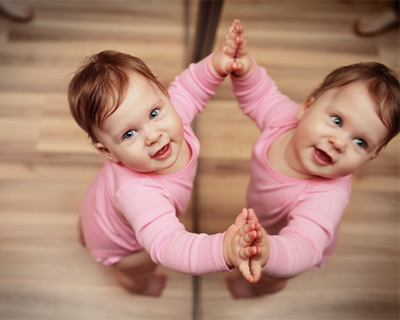A baby's vision goes through many changes during their first year of life. Your pediatrician will check your infant’s vision at each well-child visit. They make sure your baby's vision is developing as it should. Knowing what to expect can help you watch and enjoy your child’s visual development.
A word about premature babies
We base the vision development milestones below on your baby's due date, not based on the date they were born.
Newborns: adjusting to light and beginning to focus
At birth, an infant is very sensitive to bright light. You may notice how small their pupils look, limiting how much light enters their eyes. A newborn baby can see something next to them with their peripheral (side) vision, but their central vision is still developing.
Within a couple of weeks, as their retinas develop, a baby’s pupils widen. They can see light and dark ranges and patterns. Large shapes and bright colors may begin to attract their attention. A baby also may begin to focus on an object right in front of them.
At about 1 month, your baby may focus briefly on you but may still prefer brightly colored objects up to 3 feet away. Infants are able to see across a room even at birth, but they are mostly interested in objects very close to them.
From 2 to 4 months: focusing and tracking moving objects
For their first 2 months, babies' eyes often do not work together very well. You might notice your baby's eyes appear to be crossed or they may seem to wander out to the sides. In most cases, this is normal and they will eventually correct themselves. But if one of your baby's eyes constantly turns in toward their nose or outward away from the nose, talk with your pediatrician.
At about 2 months old, babies usually are able to follow a moving object with their eyes as their visual coordination improves. In fact, at around 3 months old, your baby may have enough eye and arm coordination to bat at a nearby moving object.
At 3 months old, your baby's eyes should work together to focus and track objects. If you do not notice this happening, talk with your pediatrician.
From 5 to 8 months: reaching, recognizing, and recalling
At around 5 months old, a baby's ability to see how far an object is from them (called depth perception) has developed more fully. They are seeing the world in 3 dimensions (3-D) more completely. They get better at reaching for objects both near and far. They also have good color vision at this point, though not quite as fully developed as an adult's.
At this stage, a baby may recognize their parent across a room and smile at them. They can see objects outside when looking through a window. They might even remember what an object is even if they only see part of it.
Babies generally start crawling at around 8 months old, and this further enhances their hand-eye coordination.
From 9 to 12 months: gripping, grasping and on the go
At about 9 months old, babies can generally judge distance pretty well. This is about when they start to pull themselves up to stand. Your baby's eyes are probably their final color now. However, it is not uncommon to see some slight changes later.
At around 10 months old, babies can usually see and judge distance well enough to grasp something between their thumb and forefinger.
By 12 months old, most babies are crawling and trying to walk.
Steps to make sure your child's eyes and vision develop properly
Eye or vision problems can delay a baby's development. It is important to find these problems as early as possible so you can get them the help they need to grow and learn properly.
Parents should take these important steps:
- Watch for problems like inward or outward turning eyes or significant delays in tracking moving objects. Bring them to your pediatrician's attention.
- Get infant/child eye screenings as recommended to catch any vision problems early.
- Ask your pediatrician for age-appropriate activities you can do with your baby to help develop their vision.